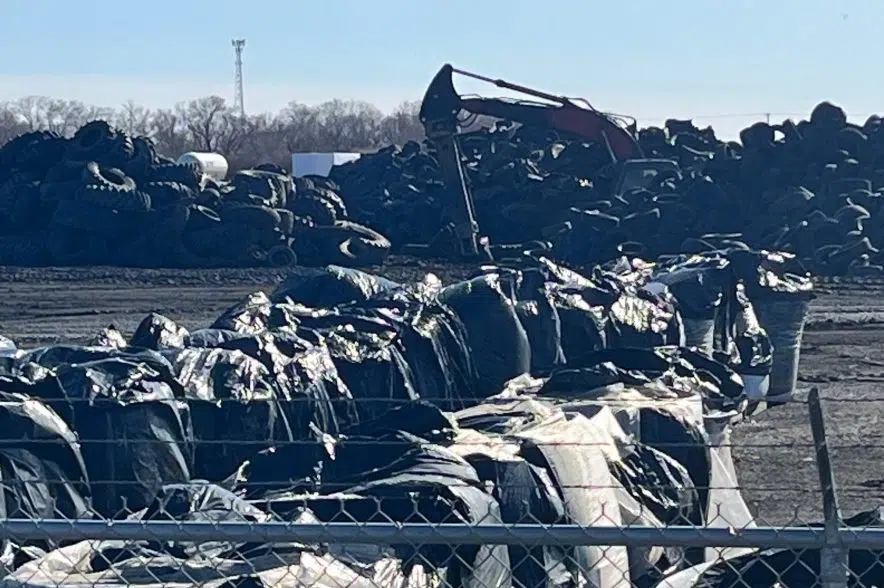A North American scrap tire recycling expert with nearly 40 years of experience is critical of the Tire Stewardship of Saskatchewan’s (TSS) plan to bring in a second tire recycling company to the province.
Michael Blumenthal was the vice-president of the Rubber Manufacturers Association and now works as an industry consultant. He’s completed scrap tire recycling-based projects throughout Canada and the U.S.
In a letter written to Environment Minister Dana Skoropad dated Oct. 31, Blumenthal criticizes the plan.
“The matter at hand is that decisions made by the Tire Stewardship of Saskatchewan can seriously jeopardize the stability of the current situation,” he wrote. “Given the generation rate of scrap tires and the distribution on your population, having two scrap tire companies will likely cause both companies to fail.
“Should these events unfold, Saskatchewan would have an immediate scrap tire crisis.”
The TSS, which oversees all scrap tire recycling in Saskatchewan, awarded a contract to U.S.-based company Crumb Rubber Manufacturers (CRM) to process and recycle up to 100 per cent of the scrap tires collected in Saskatchewan at a new facility near Moose Jaw.
A Request for Proposals for a Saskatoon-area processor was also issued nearly two weeks ago.
Saskatoon’s Shercom Industries already had a tire recycling facility operating, and had been trying to negotiate a long-term contract with the TSS for three years without success. As of May 1, Shercom was no longer able to accept Saskatchewan scrap tires.
President Shane Olson said dozens of employees were laid off, and its tire processing plant shut down.
When contacted by telephone in New York, Blumenthal couldn’t understand why the TSS sought out the U.S. recycler because the province already had a facility to process tires.
“Shercom, they are a freak of nature in the scrap tire business because they have succeeded where few others have,” he said.
He explained that because Saskatchewan only produced about one million scrap tires per year, the market would not likely support a second tire recycling company.
“I have yet to see any scrap tire processor be successful processing less than a million tires a year. The economics aren’t there,” he added.
Blumenthal wondered when the Moose Jaw plant would be operational, suggesting that while CRM gets up and running, tires could begin piling up. He also questioned what would happen to the ground rubber when CRM’s plant became operational.
“What Shercom has done over the years is they’re making ground rubber, but they’re making their own products. They’re not selling the ground rubber into an oversold market. They’re making high-end rubber products. That’s the highest and best use,” he said.
In a previous interview, TSS CEO Stevyn Arnt suggested the ground rubber produced by CRM could be sold to the Saskatchewan Ministry of Highways.
“I know that their rubber-modified asphalt, I believe the Ministry of Highways is anxiously looking forward to learning more about,” Arnt said. “If they can sell 100 per cent in Saskatchewan, they will sell 100 per cent in Saskatchewan.”
Arnt also said it was unfortunate that the TSS and Shercom couldn’t work out an agreement.
““I understand they’re very upset. No one likes to lose a monopoly,” he said.
Blumenthal suggested that if another collector came to Saskatchewan, Shercom could either drop out of the TSS program or relocate to Alberta, where he argued a more stable market exists. He cautioned the TSS and the provincial government on its future plans.
“Saskatchewan will go from having a scrap tire program that completely takes care of every tire in the province, where there’s no longer any problems with scrap tires, and you’re going to destroy it and basically create potential for piling of tires in the south and losing a high-value employer in the north,” he said.
“I think the program has every potential to implode and you may find yourself in a situation that you had 30 years ago,” he added.
On Monday, Premier Scott Moe asked the TSS to pause its search for a Saskatoon-area tire processor while a review of the scrap tire industry and its future needs was conducted.











